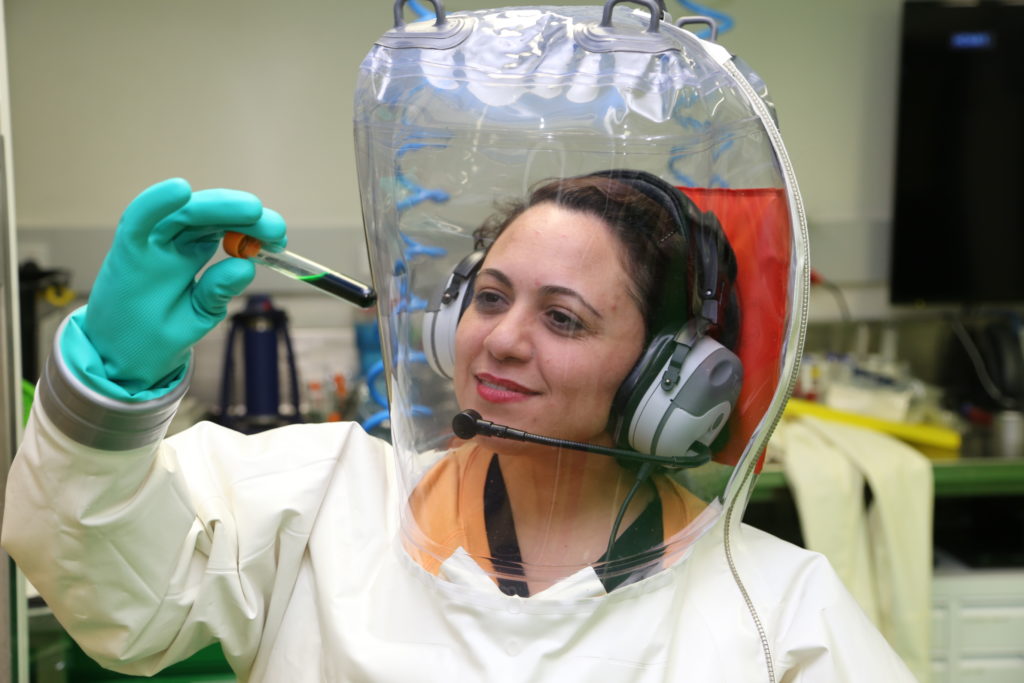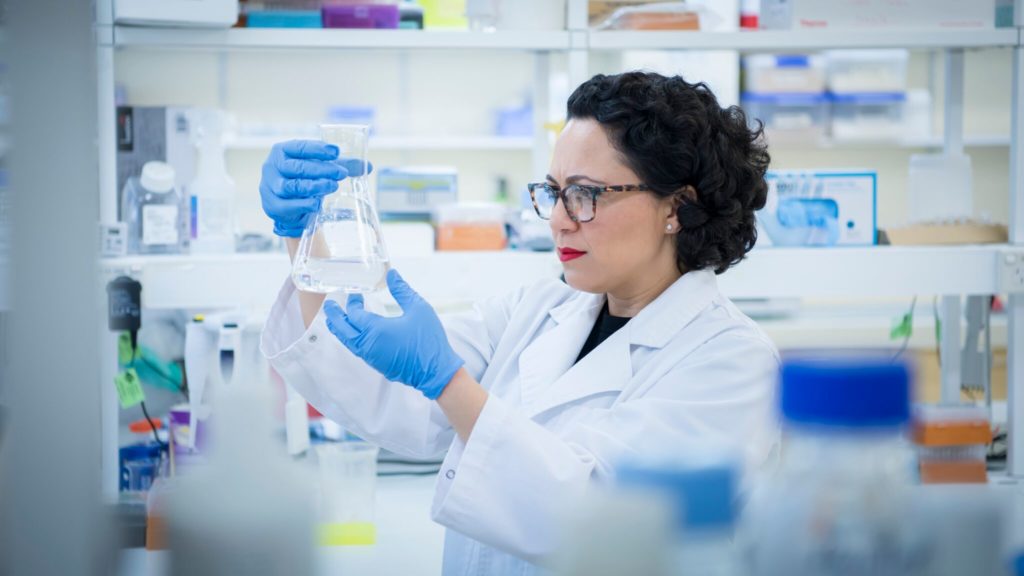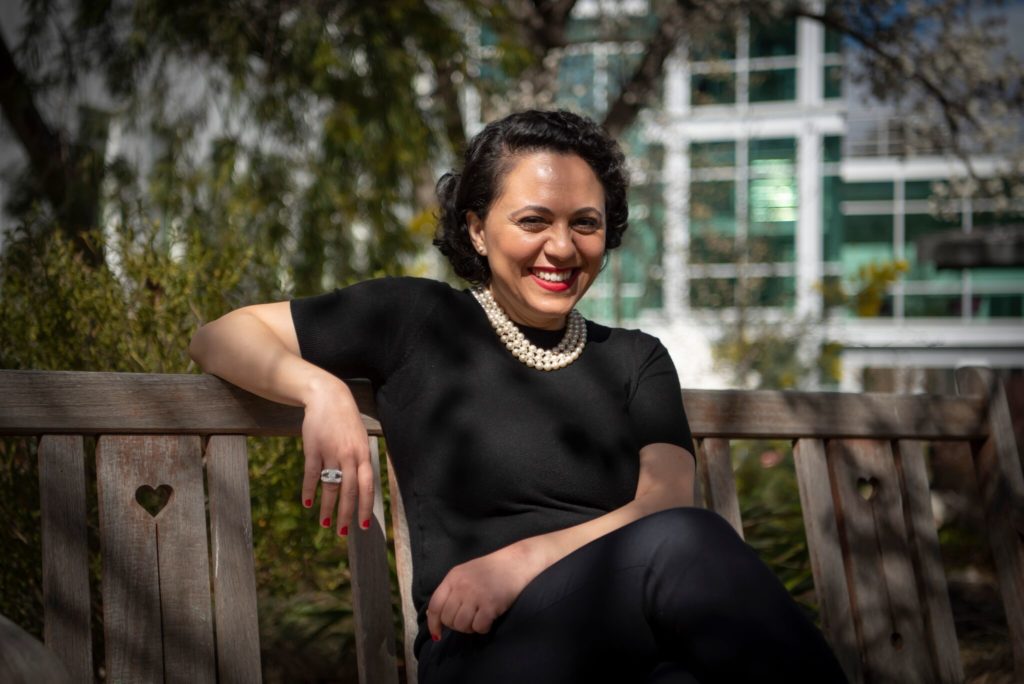
Samia Elfekih works at our Australian Animal Health Laboratory in Geelong.
As a little girl in Tunisia, Samia Elfekih would pick flowers from a jasmine plant growing at her house… and boil them, just to see what happened.
This was one of the first hints of the curiosity that would propel Samia into an international career in science. She first completed her PhD in Tunisia and the US with a Fulbright scholarship, then followed it up with a postdoc in the UK funded by the L’Oreal-UNESCO For Women in Science program.
Now a Tunisian-Australian, Samia is a research scientist in our health and biosecurity team, based at our Australian Animal Health Laboratory (AAHL) in Geelong. With a background studying invasive insect species, Samia now considers herself a “science diplomat”. She commits herself to fighting vector-borne diseases such as dengue, malaria and Zika, spread by mosquitoes to hundreds of millions of people around the world.
Samia’s now about to make history by being the first Tunisian woman to set foot in Antarctica. She’s part of a contingent of women heading off on a three-week voyage to Antarctica as part of the externally run Homeward Bound program for women in STEM, a 12-month program that aims to increase participants’ leadership capacity, strategic capability and collaboration. Six of our scientists are heading off on the next Homeward Bound voyage.
We sat down with Samia for a chat about her career and her trip before she sails off into the wild.

Samia considers herself a science diplomat, working to establish research projects around the world.
You call yourself a “science diplomat” or “science entrepreneur”. What does that mean?
Hundreds of millions of people around the world suffer from mosquito-borne diseases. It’s such a massive problem that it’s not possible for just one agency or country to solve it; we must have a coordinated approach. Through CSIRO, I work closely with public offices and political figures – such as departments of foreign affairs, diplomats and ministers – throughout North Africa and the Middle East to establish research projects against mosquito-borne disease.
What do you want to achieve through your career?
My ultimate dream goal is to alleviate human suffering caused by vector-borne diseases. I am currently leading a project on managing dengue fever in the Middle East using eco-friendly technologies. The biggest reward in this project will be if I hear from the general population that dengue cases have decreased, and we have fewer people dying from these diseases.
As a scientist, I feel privileged to work at AAHL. My immediate goal is to deliver high-quality research with a strong societal impact.
Why are you taking part in the Homeward Bound project – what do you hope to get out of it? (Are there mosquitoes in Antarctica?!)
I want to improve my leadership potential, learning from other women’s experiences and reflections on their leadership style. I am always looking for a sense of belonging and empowerment. Being around bright intelligent women from all over the world and all disciplines will definitely be a very enriching experience.
Antarctica is too cold for mosquitoes. But the Antarctic expedition will give us the opportunity to observe first-hand the influence of human activities on the environment and the global scale of change required. All while creating strong bonds amongst participants!
I want to use this opportunity to grow, to break free from so many limitations and beliefs and, most importantly, to finally start learning how to be simply “unapologetically successful”!
What are you most excited about for your Homeward Bound trip?
I am excited about the unique opportunity of getting extensive leadership training for a whole three weeks – and in Antarctica! Not a bad place to be!
I am also very thrilled to visit Antarctica for the first time. When I was a postdoc at the Natural History Museum in London, I had a colleague who conducts research on cyanobacteria (aquatic bacteria) in Antarctica. Her amazing research is one of the major reasons that drove me to apply for the program.

A smiling woman sits on a bench outdoors in dappled light.
Samia is heading to Antarctica on the Homeward Bound trip to face her fears and become a better person.
I hear Antarctica might give you a pretty… frosty reception. Is there anything you’re nervous about?
I am nervous about being in such an extreme environment. I’m an unusual type of scientist, I don’t really go hiking or camping. I am more of a city person, passionate about modern art and haute couture. Suddenly I’ll be finding myself in the middle of penguins and considering a polar plunge! Daunting, thrilling, exciting! This trip is helping me face all my fears and become a better person on all fronts.
Are you packing anything to take with you for good luck?
I am bringing a spa liquorice tea that reminds me of Melbourne, and the loved ones I carry in my heart everywhere I go.
You’ll be the first Tunisian woman EVER to go to Antarctica. What does that mean to you?
It means a lot! I have always wanted to make a difference in this world. This trip to Antarctica is inspiring to younger generations of women to pursue their dreams in life and be aware that no matter who they are or where they come from, their hopes and dreams are valid!
I remember years ago, I hoped to even have the opportunity to get in touch with professors, scientists… it seemed so impossible. Now I not only work with these people, but they value my opinion and my input. I feel so accomplished and so proud. I always think despite the hardship, the limitations, the setbacks I had to go through, this is my story and I own it with resilience and pride!
What does everyone else think back in Tunisia?
Everyone is thrilled about my trip. They are so proud and so excited! They see me as a Tunisian success story and a role model for the younger generations of Tunisian women.


3rd December 2019 at 8:39 am
Hi Hedi – thank you for your question.
Scientists say it’s to do with the smell of your skin. Everyone’s skin has a different smell, which has to do with lactic acid and the bacterial composition of your skin. Apparently stinky socks are also really attractive to some species of mosquito. Wearing dark clothing can also result in more bites as mozzies are attracted to it – they like to hide in dark places.
Hope this helps!
Kind regards,
Kashmi
Team CSIRO
23rd November 2019 at 9:00 am
I wanted to know why mosquitoes attack people and not others in the same place and I myself had the esperience